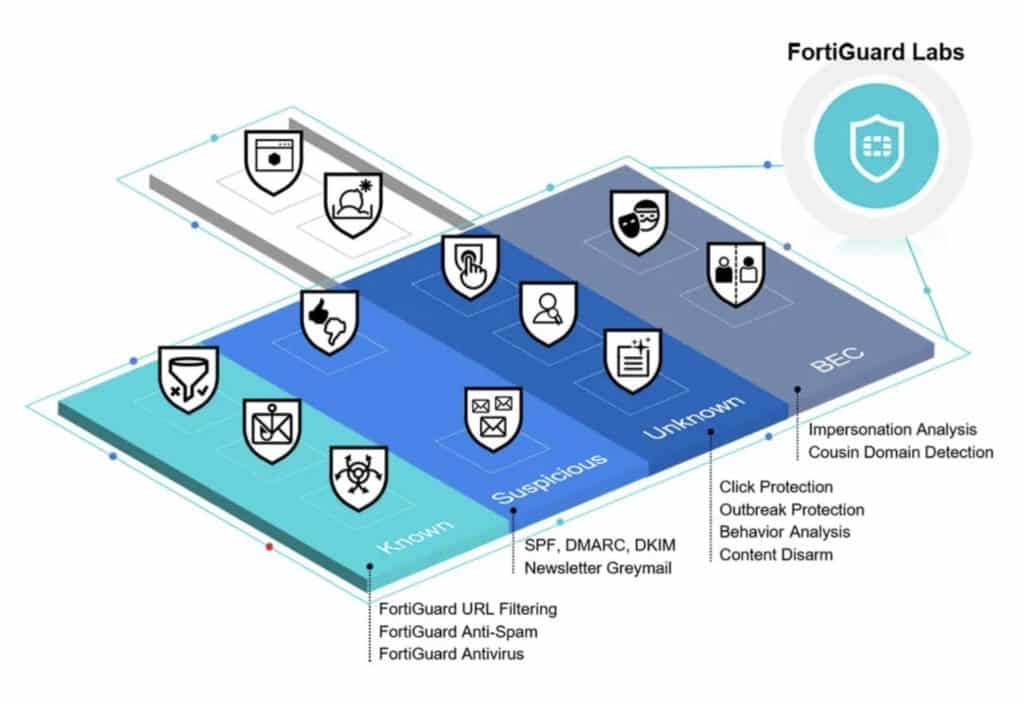Fortinet

Fortinet is a cybersecurity vendor with two decades of experience and an extensive stack of solutions for channel partners, service providers, small businesses, and enterprise organizations.
Fortinet’s products and services cover security across today’s hybrid infrastructure for on-premises, software-defined, virtual, cloud, and edge networks. The cybersecurity company has long been known for its next-generation firewalls (NGFWs) and web application firewalls (WAF), offering visibility and control of network and application traffic and mitigating threats.
This article looks at Fortinet’s products and solutions, competitors, partner ecosystem, recognition, and vendor background.
In this definition...
Fortinet Products and Solutions
Foundational Security for Networks
Fortinet offers extensive network security products for small businesses and enterprise clients. The top of the list features the vendor’s industry-recognized NGFWs, FortiGate, followed by WAN and LAN protection, intrusion prevention systems (IPS), virtual private networks (VPN), and secure web gateways.

Additional solutions in the network security realm offer SSL inspection, network automation, perimeter security, and application optimization. With FortiGate’s firewall-as-a-service (FWaaS) technology, users can also use Fortinet Fabric Connectors to enable open, application programming interface (API)-based integration with multiple software-defined networks (SDN), cloud, management, and partner technology platforms.
Read more: Top Next-Generation Firewalls (NGFW) Vendors for 2022 | eSecurityPlanet
Monitoring and Protecting Cloud Infrastructure
With cloud infrastructure now a critical part of any enterprise organization, Fortinet provides visibility and control for infrastructure as a service (IaaS) and software as a service (SaaS) with the company’s cloud access security broker (CASB), FortiCASB. Cloud infrastructure solutions support all major cloud service providers: AWS, Alibaba Cloud, Azure, Google Cloud, and Oracle.
Additional cloud security products offered by the enterprise vendor include:
- FortiWeb: Web application firewall
- FortiADC: Application delivery controller (ADC), also known as a load balancer
- FortiMail: Email security software
- FortiDDoS: DDoS (distributed denial-of-service) attack protection

Fabric Agent for Endpoint Security
Part of Fortinet’s strategy regarding zero trust network access (ZTNA) architectures includes its remote access and control endpoint solution, FortiClient. FortiClient is a lightweight agent for protecting and securing devices and communicates with the company’s Security Fabric to ensure comprehensive endpoint security across an organization’s IT environment.
Administrators can utilize device activity reporting, sandboxing for suspicious files, URL filtering, and other security functionality.
Security Operations at Scale
Security operations centers (SOC) are responsible for managing and assisting a universe of clients with the latest security solutions, global threat intelligence, incident response (IR), and automation capabilities. The company offers traditional endpoint detection and response (EDR) and extended detection and response (XDR), which incorporates detection for inside threats, managed detection and response functionality, and more.
Fortinet can help clients deploy and optimize critical security systems like user and entity behavior analytics (UEBA), security information and event management (SIEM), and security orchestration automation and response (SOAR) solutions.

Also read: Fortinet Cybersecurity Portfolio Review | Datamation
Fortinet Competitors
- Barracuda
- Check Point
- Cisco
- Forcepoint
- Juniper Networks
- Palo Alto Networks
- SonicWall
- Sophos
- WatchGuard
- Zscaler
The Open Fabric Ecosystem
Fortinet firmly believes in an open architecture that provides interoperability in the universe of security solutions. The enterprise vendor has an extensive network of technology alliance partners to deliver end-to-end cybersecurity for clients through the Open Fabric Ecosystem.
Fortinet’s Security Fabric includes more than 170 technology partners offered as integrated, partner-developed APIs, vendor-developed Connectors, and community-driven DevOps Tools. The vendor’s list of Fabric Connectors includes several globally-recognized names, including:
Read more: Enterprise VPNs: Fortinet vs. Cisco AnyConnect | Enterprise Networking Planet
For Services Providers
As IT infrastructure grows and becomes more critical, organizations look to tenured service providers for outsourcing wireless and telecommunications network management and cybersecurity operations.
Managed Security Service Providers (MSSP): MSSPs fill the cybersecurity gap for clients by offering security solutions for SD-WAN, SOC replacement, cloud infrastructure, web applications, and identity and access management (IAM).
Communication Service Providers (CSP): CSPs monitor and protect sensitive vendor and customer data traversing telecommunication networks and meet applicable standards like PCI-DSS and the PCI Software Security Framework (SSF).
Mobile Network Operators (MNO): MNOs control 4G and 5G mobile infrastructure with the vendor’s fabric of security solutions, including coverage for radio access networks (RAN), private 5G networks, telco clouds, and IoT ecosystems.
For Channel Partners
Interested organizations can apply to join the Fortinet Engage 2.0 Partner program based on criteria like engagement, business model, and specializations. Once verified, clients can use the company’s partner locator to find local and regional partners for North America, EMEA, Latin America, and APAC.
Also read: Best Email Security Providers & Services 2022 | Channel Insider
Recognition and Reviews
Fortinet consistently receives praise from reputable industry analysts as a top cybersecurity company. Below are the vendor’s most recent placements in marketplace reports from Gartner and Forrester, as well as customer reviews from Gartner Peer Insights.
Gartner Magic Quadrant
- Network Firewalls (2017–2021): Leader
- WAN Edge Infrastructure (2021): Leader
- Security Information and Event Management (2021): Visionary
- Web Application Firewalls (2020): Challenger
- Unified Threat Management (2018): Leader
Gartner Peer Insights
On Gartner Peer Insights, Fortinet has reviews for over 30 products with an average score of 4.6 out of 5 stars across almost 4,000 reviews. Customer reviews highlight the comprehensive, integrated solutions, ease of deployment and administration, and the innovative technology underpinning products and services.
The company’s top-performing solution categories and ratings include:
| Solution Category | Rating | Reviews |
| Network Firewalls | 4.6 | 1,935 |
| WAN Edge Infrastructure | 4.6 | 476 |
| Enterprise Wired and Wireless LAN Infrastructure | 4.6 | 304 |
| Web Application and API Protection | 4.5 | 234 |
| Endpoint Protection Platforms | 4.6 | 219 |
Forrester Wave
- Industrial Control Systems (ICS) Security Solutions (Q4 2021): Strong Performer
- Enterprise Email Security (Q2 2021): Strong Performer
- Enterprise Firewalls (Q3 2020): Strong Performer
- Web Application Firewalls (Q2 2018): Contender
- Security Analytics Platforms (Q3 2018): Contender
Read more: 10 Best CASB Security Vendors for 2022 | eSecurityPlanet
Fortinet: Company Background
After founding NetScreen Technologies in 1997 (later acquired by Juniper Networks), Ken Xie joined with brother Michael Xie to launch Fortinet in 2000. The success of its FortiGate, anti-spam, and antivirus software led the vendor to become a market leader in the unified threat management (UTM) market in the 2000s.
In November 2009, the enterprise vendor went public under the ticker FTNT on the Nasdaq stock exchange. Fortinet has made 17 acquisitions in its history, including AccelOps, Bradford Networks, enSilo, Meru Networks, OPĀQ, and ShieldX Networks. In 2021, the company reported annual revenue of $3.34 billion with a market capitalization of over $51 billion.

Recent Coverage
- Top NGFWs: Fortinet vs. Palo Alto Networks | eSecurityPlanet
- The Security Implications of Application Proliferation | eWEEK
- Top Cybersecurity Companies for 2022 | eSecurityPlanet
- Zero Trust Access: 5 Key Points to Deploy ZTA to Your Network | eWEEK
- Hackers Leak 87,000 Fortinet VPN Passwords | eSecurityPlanet
- Why Acquisitions, Partnerships are Key to Simplifying IT Implementation | eWEEK

